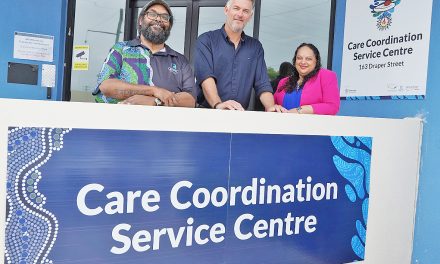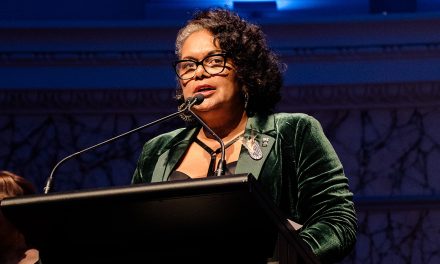Growing up in a two-and-a-half bedroom house with six siblings and no electricity, water or a fridge isn’t the easiest start in life, nor is it the easiest route to medicine.
The one thing it did provide Gurriny-Yealamucka Health Service GP Registrar Dr Carli “CJ” Westmore is an understanding of some of the challenges, especially the social determinants of health, experienced by people living in Yarrabah.
“Sometimes patients I see, you know, can’t keep medicine in a refrigerator,” she said.
“They’re like, ‘I’m sorry, doctor, I don’t have a fridge, I’ve got a hole in the ground,’ or, ‘I’ve got a pot in the creek and it stays cool, but not as cold as a fridge.’
“You’ve got to ask the questions, you’ve got to think outside the box, you’ve got to find ways.”
CJ has been a member of the Gurriny Yealamucka team since July 2023, working mostly out of the Bukki Road clinic, with an interest in paediatrics, obstetrics, women’s heath, Indigenous health and dental health.
She said she loved the collegial environment of the public health community and being surrounded by people who were passionate about helping improve outcomes in Yarrabah and the surrounding communities.
However, the journey to a medical career was not a straightforward one.
CJ remembers a simple childhood on the south coast of New South Wales.
The proud Eora and Awabakal woman and her siblings were mostly home-schooled, completing schoolwork in the morning or taking their books as they roamed the bush and played from sun-up to sunset.

The kids would sometimes rescue animals and had many animals as pets, including CJ’s beloved echidna.
“Echidnas are really special to me; it’s my animal,” CJ said.
“I don’t know whether it’s like a ‘totem’. But, you know, it’s an animal that I don’t eat, and I’d protect and take care of it.”
CJ’s childhood wasn’t all climbing trees and riding pushbikes though. She had to quit homeschooling in Year 10 after her elder sister fell ill and the job of taking care of her three nieces and nephews largely fell to CJ.
It wasn’t until she was 17 years old that she finished her Year 10 studies at TAFE.
CJ was then accepted into the University of Newcastle’s Open Foundation intensive tertiary preparation program, a very rigorous six-month primer for university.
From there, CJ studied a Bachelor of Oral Health at Newcastle, quickly graduating from the oral health program in 2008. She is currently a fully qualified, registered and practicing dental hygienist.
While CJ’s homeschooling psychologically prepared her for tertiary studies, there was cultural adjustment interacting with a cohort that often came from the leafier suburbs.
“Homeschooling and uni are very similar. No one’s pushing you around, you’ve got to make yourself do the work,” she said.
“But it is nerve wracking.”
After completing her dental training, she went on to study a Bachelor of Medicine.
“Coming from not a very financially well-off background, I didn’t have all the bells and whistles 98 per cent of medical students had, who’ve come from a wealthy family, usually multi-generational doctors.
“They had fancy laptops and smartphones and I had an old Nokia and no laptop.”
However, CJ found solace in the company and support of other Indigenous medical students on campus.
“There is strength in getting together with other Indigenous medical students and doctors, that was really, really helpful,” CJ said.
One of CJ’s recurring mantras is, “you can’t be what you can’t see”, and she places a lot of importance on showing people that despite obstacles, despite growing up without family wealth, careers like medicine are still possible.
“I always encourage patients, even at med school, even if they don’t feel particularly academic, if they don’t think there’s a way into uni, usually there is,” she said.
“So, I think it’s nice to know that, you know, as a doctor it’s possible to not necessarily come from a wealthy background or a family of doctors.”
CJ came to Yarrabah through the work of her stepdad, Alan Cummings, who has been coming to the region for half a century and is considered a friend to the Elders in Yarrie.
One day when CJ was visiting her mum and stepdad, Alan asked if she wanted to go on a mini road trip to Yarrabah so he could meet with some community Elders.
While there, she stopped in at Gurriny Yealamucka and introduced herself.
After a chat with Director of Medical Services, Dr Jason King, she asked if there were any GP Registrar positions available. It just so
happened that there was an open position and CJ had her interview then and there.
CJ’s start at Gurriny Yealamucka was delayed due to a nasty bout of COVID-19, which caused some anxiety about disappointing her new employer.
“It’s nerve wracking at first because you want to be just the top of your best when you come into Community,” she said.
“You don’t want to be in any way getting back on your feet or facing illness — just because it is more difficult medicine, and you’ve got so much riding on it.
“There are so many more chronic diseases and many (patients) are a lot sicker than everyday GP patients in cities.
“So, it’s like, am I going to be good enough for this?”
In the end, CJ’s transition to community control has been smooth, thanks to the support of the team at Gurriny-Yealamucka.
And it really is a team effort. According to CJ, much of the success of Gurriny Yealamucka is due to combining clinician-based knowledge with local-based knowledge.

“Gurriny has some really good health staff, particularly the health workers in the community,” she said.
“They might not have the kind of level of medical knowledge as the doctors and nurses, but they have the local knowledge; and marrying that together, that’s where you get the wins.”
CJ describes their interrelationships like a fishing net, everyone linking together in the effort to keep the people of Yarrabah safe, healthy and happy.
“It’s almost like forming a fishing net, you’re wanting to not let anything slip through the cracks, and you’re only specialised in one little bit,” she said.
“So, it’s kind of, you know, learning everyone’s place in that fishing net and how to use each other, not in a negative way, but using everyone’s skills across the board.
“I think their strength is in how they link people together, rather than being a pyramid structure.
“The structure is that no one’s more or less important than each other. We really work in tandem all together, shoulder to shoulder.”











